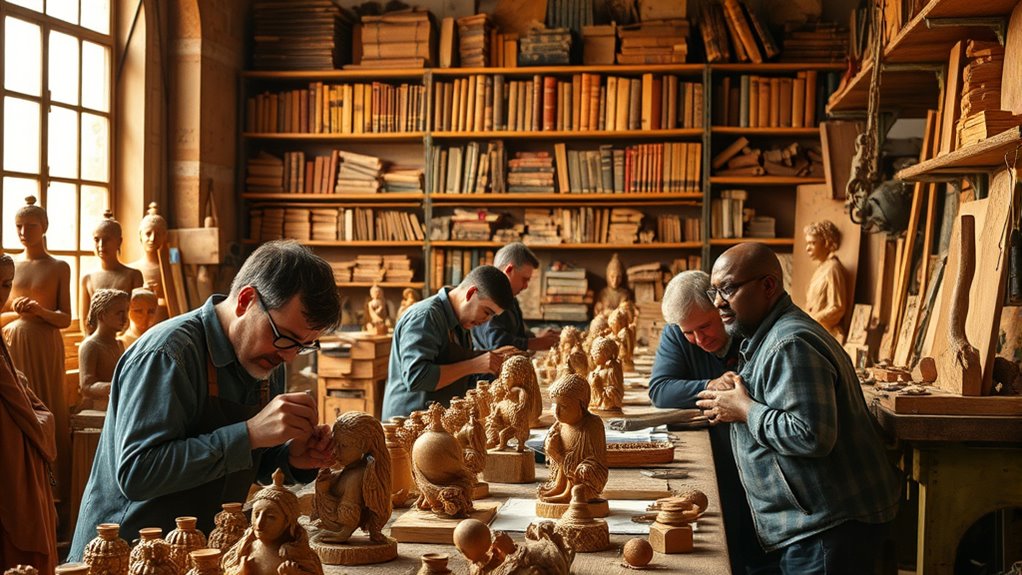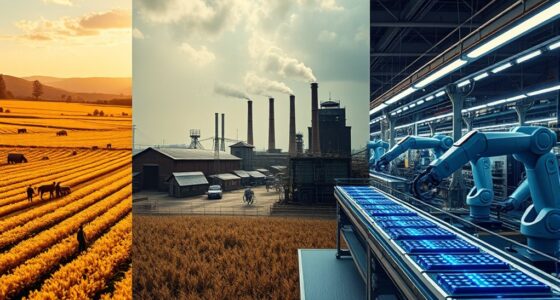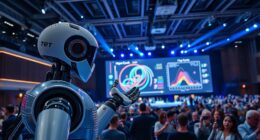Careers that stay safe from automation rely on qualities like empathy, creativity, and complex decision-making. Think of healthcare roles such as nurses and doctors, which depend on understanding emotions and providing comfort. Education, social work, and counseling also remain secure, as do skilled trades like electricians and firefighters. Strategic thinkers like managers and researchers, along with manual labor jobs, require adaptability that robots can’t match. To find out more about these resilient careers, explore what makes them uniquely human.
Key Takeaways
- Healthcare professionals like doctors, nurses, and therapists rely on empathy and nuanced judgment, making them less vulnerable to automation.
- Education and social support roles require interpersonal skills, mentorship, and emotional understanding that machines cannot replicate.
- Creative fields such as artists, writers, and designers depend on originality and contextual intuition, resisting automation efforts.
- Skilled trades like electricians, plumbers, and mechanics involve hands-on problem-solving in unpredictable environments, challenging to automate.
- Leadership, strategic planning, and complex problem-solving roles demand human judgment, intuition, and social influence, maintaining their relevance.

As automation continues to advance, many jobs face the risk of being replaced by machines. However, certain careers remain resilient because they depend heavily on uniquely human qualities like empathy, emotional intelligence, and personal interaction. If you’re considering a profession that’s less vulnerable to automation, careers in healthcare are prime examples. Roles such as nurses, doctors, therapists, and counselors require personalized care and empathy that machines can’t replicate. Your ability to understand a patient’s emotions, provide comfort, and adapt treatment plans relies on nuanced human judgment, making these jobs secure options.
Healthcare careers like nursing and therapy rely on human empathy that machines can’t replicate.
Similarly, teaching and education are less susceptible to automation because they depend on interpersonal skills, mentorship, and the ability to inspire students. As an educator, you utilize training, patience, and emotional connection—traits that AI struggles to imitate. Social workers and psychologists also fall into this category. Their work involves interpreting subtle emotional cues, steering complex human dynamics, and offering support that demands genuine empathy and understanding. Customer service roles that involve complex problem-solving or conflict resolution are likewise less likely to be automated, especially when your skills in managing difficult situations and providing personalized solutions are essential.
Careers that revolve around creativity and strategic thinking are also safe from automation. As a marketing manager, your job involves analyzing data, monitoring trends, and crafting campaigns that appeal to human emotions—tasks that blend analytical skills with creativity and social influence. Artists, writers, and designers rely on originality and contextual creativity, which AI cannot truly generate. Business leaders and entrepreneurs perform judgment-based tasks involving leadership, innovation, and strategic decision-making, making their roles resistant to automation. Content creators who develop unique, innovative ideas also stand a good chance of staying relevant, as AI has yet to match human ingenuity.
Skilled trades and maintenance work remain largely safe from automation because they require hands-on skills and adaptability. Electricians, plumbers, mechanics, and construction workers operate in unpredictable environments where problem-solving and dexterity are vital. Firefighters, with their manual labor, quick reflexes, and ability to handle hazardous situations, are difficult to replace with robots. Technicians who maintain specialized machinery also play critical roles that demand practical skills beyond AI’s current scope.
Finally, jobs involving complex problem solving and leadership are less vulnerable. Data analysts and scientists interpret complex datasets, and their expertise in domain-specific knowledge makes automation challenging. Roles that require ongoing innovation, strategic planning, and managing multifaceted variables, such as researchers and strategists, remain safe because they depend on creative thinking. In leadership positions, your ability to motivate, influence, and steer interpersonal dynamics makes you indispensable. These careers thrive because they hinge on distinctly human qualities that machines can’t emulate—empathy, judgment, and nuanced decision-making.
Furthermore, careers in cybersecurity and ethical hacking are increasingly vital as technology advances, and their reliance on judgment and intuition makes them difficult to automate fully.
Frequently Asked Questions
How Do Emotional Intelligence Skills Affect Automation Risk?
Your emotional intelligence skills greatly influence your automation risk. By developing empathy, communication, and adaptability, you become more valuable in the workforce, as these human skills are less automatable. High EI helps you adjust to new technologies, manage change, and maintain strong relationships. This makes you more resilient to job displacement, increases your job security, and keeps you relevant in an evolving, automated environment.
Which Industries Are Least Vulnerable to Future Automation?
You might wonder which industries face less risk from automation. Sectors like healthcare, education, creative arts, skilled trades, and social services are less vulnerable because they rely heavily on human interaction, creativity, and complex decision-making. These fields demand empathy, adaptability, and ethical judgment, making automation difficult. By focusing on roles that require personal touch and nuanced understanding, you can find careers better protected from future technological disruption.
Can Creative Roles Become Automated in the Future?
Did you know that 70% of creative professionals believe AI will enhance their work rather than replace it? Your creative roles are unlikely to be fully automated because tasks like emotional storytelling and nuanced design require human judgment and emotional intelligence. While AI tools can assist, they lack the depth of human experience. You’ll find that collaboration with AI opens new opportunities, making your skills more valuable than ever.
How Does Geographic Location Influence Career Automation Vulnerability?
Your geographic location greatly influences your career’s vulnerability to automation. If you’re in a city with a strong manufacturing base, like Detroit, you’re more at risk due to automation and robotics. Conversely, if you’re in a highly educated metropolitan area, like San Jose, your job is less vulnerable because of complex, interpersonal tasks that AI can’t easily replace. Urban areas with diverse economies tend to offer more resilience against automation.
What Skills Should I Develop to Stay Future-Proof?
To stay future-proof, you should develop skills like technological literacy, creative thinking, and emotional intelligence. Embrace lifelong learning through online platforms, and focus on soft skills such as communication and adaptability. Stay updated with industry trends, learn to work with AI tools, and seek opportunities for upskilling and reskilling. These skills will help you adapt to changing job demands and remain valuable in an evolving job market.
Conclusion
So, while automation might seem like a tidal wave, some careers remain your sturdy lighthouse. Think of these jobs as a cozy cabin in a storm—resilient and hard to replace. By honing skills that require human touch, creativity, and empathy, you’ll stay ahead of the tide. Keep adapting, stay curious, and remember, your unique human qualities are your best defenses against the ever-advancing machines. Stay safe, stay valuable.









